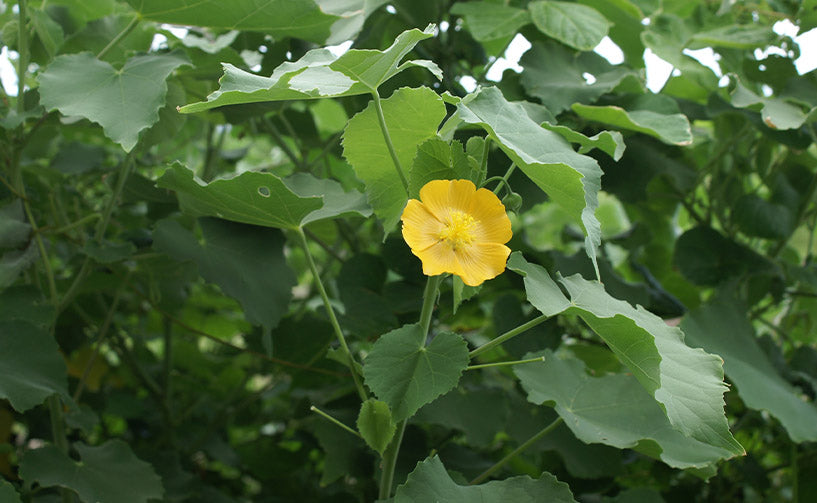Atibala also known as Abutilon Indicum is a small plant from the Malvaceae family. It is famous as Indian abutilon or Indian Mallow. In Sanskrit, it is called Atibala meaning very powerful.
It is small perennial plant with a height of around 1-1.5m. The bark of the plant is thin and doesn’t require much effort for being peeled off. The leaves of this plant are around 9 to 5 cm in size. Flowers are yellow in colour with long pedicels. There are around 15-20 carpel in the flower. The seeds are kidney shaped, dark brown or black in colour. The plant has tap roots with many lateral branches. Roots, leaves, seeds and flowers all are of great importance for the body.
This plant is found mainly on tropical islands. In India, it is largely cultivated in Tamil Nadu. Where in some areas, this plant is popular for its ornamental value the other areas consider it important due to the significant medical properties. The entire plant is useful for medical purposes. Its constituents are flavonoids and amino acids, alkanols, vanillic, hescoses, etc.
It is considered easy and light for digestion. The potency of this plant is cold. It is considered as a natural way of balancing the doshas of the human body. It is enriched with laxative, diuretic, sedative, analgesic (pain relieving) and anti-inflammatory properties. All these properties make it appropriate for medicinal use in Ayurveda.
Major issues that can be tackled by the use of this herb are fever, cold, ulcers, bronchitis, diabetes, coughs, inflammation, piles and urinary disorders. Different parts of the plant are responsible for treating different health issues.
Benefits of Atibala Plant
-
Diuretic property: The roots, bark and seeds of atibala plant are extremely useful in urinary problems and inflammation of bladder. This plant acts as a natural diuretic that also helps in treating urinary infections and infections in the sexual organs.
-
Protects the liver: Atibala is rich in hepatoprotective activity. It protects the liver naturally and improves digestion. The juice of the leaves has healing action and can treat ulcers.
-
Helpful in arthritis: Joint pain, stiffness in joints and immobility are some of the effects of arthritis. Atibala helps in reducing the pain and reduces inflammation. The super effective anti-inflammatory action helps in relieving these symptoms of arthritis.
-
Anti-malarial action: Malaria is characterised by high fever, nausea, shivering and pain. The anti-malarial action of atibala plant helps in treating malaria. It reduces the pain, helps in treating fever and strengthens the body to fight against malaria.
-
Hypoglycaemic Power: The leaves of atibala plant are rich in hypoglycaemic power. With the use of atibala, plasma glucose levels are altered which benefits patients suffering from diabetes. Thus, this plant is of great importance to diabetics as it lowers sugar level naturally.
- Natural Laxative: Constipation leads to many issues like haemorrhoids and gastric issues. Use of atibala plant can help in getting rid of constipation naturally as it possesses the property of a natural laxative.






